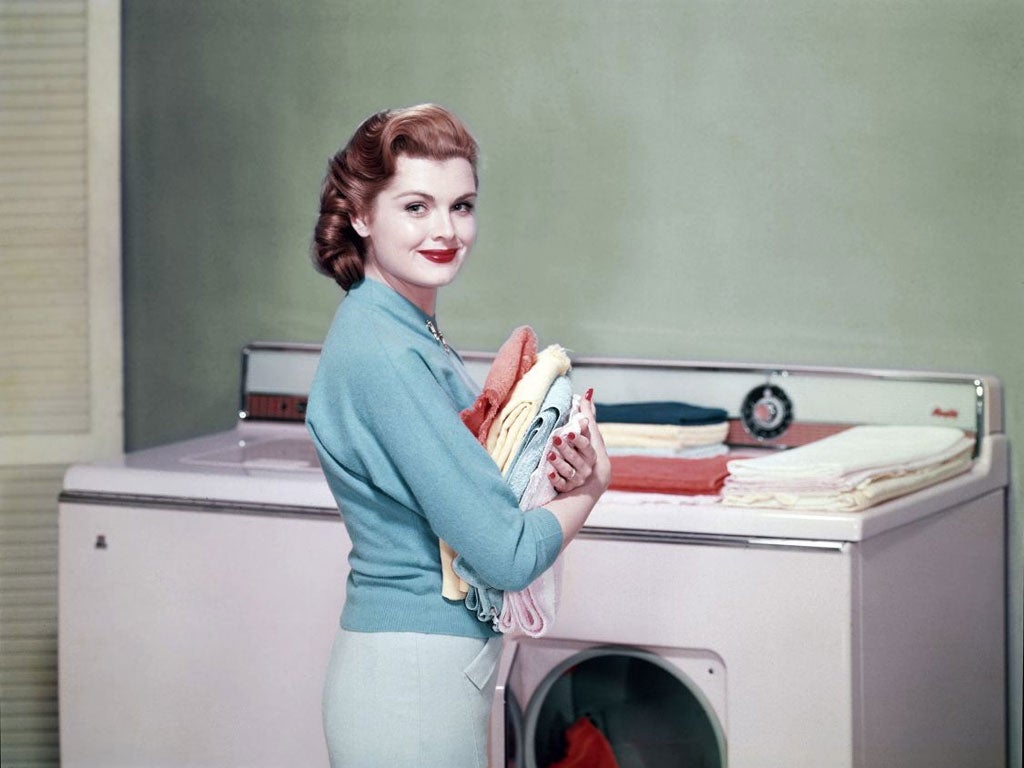Sarah Sands: Life's a breeze... as long as the washing machine doesn't pack up
A City high-flyer says domestic appliances provide life's most trying moments. Our writer agrees


Your support helps us to tell the story
From reproductive rights to climate change to Big Tech, The Independent is on the ground when the story is developing. Whether it's investigating the financials of Elon Musk's pro-Trump PAC or producing our latest documentary, 'The A Word', which shines a light on the American women fighting for reproductive rights, we know how important it is to parse out the facts from the messaging.
At such a critical moment in US history, we need reporters on the ground. Your donation allows us to keep sending journalists to speak to both sides of the story.
The Independent is trusted by Americans across the entire political spectrum. And unlike many other quality news outlets, we choose not to lock Americans out of our reporting and analysis with paywalls. We believe quality journalism should be available to everyone, paid for by those who can afford it.
Your support makes all the difference.The super-fund manager Helena Morrissey is an alpha-grade rebuke to anyone who complains of being hard-pressed. Every time I see her in close-fitting dresses and statement jewellery or reflect on her nine children and her evenings scanning Bloomberg, I think: I have seen beta days.
So it was for reprehensible reasons that I perked up to read that she had been confounded by a broken washing machine. " I have moments," she confessed softly in an Evening Standard interview, "like when the washing machine broke this week."
Others might have thought: how ridiculous. Here is a woman who balances the financial world on her slender shoulders, while simultaneously starring in her real-life Sound of Music, how could she possibly be defeated by a washing machine?
Anyone who underestimates the role of the machine in domestic harmony lives in a hotel. I hesitate to wash my dirty laundry in public, but a faulty washing machine was cited as a cause of marital breakdown in my divorce papers. A generation later, my newly married son cheerfully remarks as he swings by on his way to a working weekend that his wife is kicking up about a malfunctioning washing machine, but not to worry. I blanch and tell him to return home immediately. This is a deal breaker.
The trouble is that there is no clear gender delineation of responsibility in the case of washing machines. At the risk of crude stereotyping, washing sounds like a female activity, but machines are male. There is a popular sexist male joke: How do you get the washing machine to work? Slap the bitch. As the American psychiatrist Frank Pittman put it more respectably: "Why do otherwise sane, competent men who can wrestle bears or raid corporations shrink away in horror at the thought of washing?"
Because men are meant to be better at "engines" they might be expected to understand machine parts. Their sense of purpose is at stake. Elton John once said: "I was more ashamed that I couldn't work the washing machine than the fact that I was taking drugs."
He was too self-lacerating. Washing machines have advanced as dramatically in their way as planetary science and are as complicated to administer as space shuttles. While we stand in our work clothes, anxious to leave for work, asking our partners tersely to "fix it", we should concede that it is as hard as it looks.
It also means sacrifice without emotional reward. One of you is going to have to take a day off work, and that might only be the start of it. You will always be at the mercy of parts and health and safety regulations. My son's mistake is to believe it is worth trusting in the guarantee, with all its conditions and built-in delays. Meanwhile, his professionally stretched wife is near breaking point.
I try to be sparing with maternal advice but this time it is urgent. "Just get to John Lewis."
My washing machine memoir runs along this track. First there is the rite of passage from launderette to home-owned. The launderette speaks of student life and of cheap rented flats. Black bags of washing and a supply of coins. The choice of whether to to sit and watch or pull rank, even here, with a service wash. The disappointment that the clothes are never quite clean and a little too dry.
This Sunday scenario is left behind in the new order of cohabitation. White goods are the first great romantic purchase, which is why their inability to function can become a poignant metaphor. My marital washing machine was unable to absorb the burden of baby clothes. It would not spin; it could not dry and it leaked across a beautiful flagstone with its intricate underfloor heating. In the end, it defeated us and we went our separate ways, with separate washing machines.
I use this as an excuse for a gobsmacking extravagance. A friend once came round as I was struggling to control a duvet cover on an ironing board. She persuaded me that some expenditure has a disproportionately life-enhancing effect. Business class flights (still not worth it). Laundered sheets (worth it).
If I were pushed to name a life achievement it would probably be top-of-the-range Miele followed by a Swedish brand so esoteric that I cannot even remember its name.
My leap of architectural faith has been less successful. A house designer told me that my determination to put the washing machine in a small kitchen showed a lack of imagination. It was a British thing. In the rest of Europe it was acceptable to keep the washing machine upstairs. So my state-of-the-art washing machine went outside the bathroom.
There is also a greater ethical dimension to washing machines, which is their impact on the environment. Washing machine cognoscenti will immediately recognise my reference to ISE appliances. These are the long-lasting washing machines dedicated to reducing carbon emissions. The chucking away of cheap machines is good for manufacturers but disastrous for the environment. Every time you are tempted to go to the sales, think of the coal power stations opening in China to support your careless greed.
In 2011, an international conference was held in Strathclyde to discuss this issue. We washing machine aficionados regarded it as our Davos. Some of the greatest minds thrashed out the challenge to "help break this destructive cycle". It was not specified if this referred to colours or easy iron.
When I am not watching world developments on iseappliances.co.uk, I turn to washerhelp.co.uk, which is a Mad Men fantasy. It starts by reassuring any flustered housewife: "There's never been so many different washing machines to buy." So why not rely on the reviews of a repairman? I read on, transfixed: "Most washing machine reviews focus on how it spins, what options it has. But in my opinion the most important decision is which make to buy."
The English started early in the race for the washing machine, naturally giving way to the US. The first English patent for Washing and Wringing Machines was issued in 1691. In 1782, Henry Sidgier developed the rotating drum washer, and in the 1790s Edward Beetham sold "patent washing mills" in England. Meanwhile, Nathaniel Briggs of New Hampshire patented "Clothes Washing" in 1797. Electric washing machines were in general circulation by 1904 and the first laundromat opened in Fort Worth, Texas, in 1934. In leaps and bounds, we went on to get spin dryers, automatic washing machines and front loading. Some advances were in engineering, some in market and advertising. Whoever persuaded us that we needed a conditioner?
The history of the washing machine is close to the progress of women. It remains the most liberating of domestic appliances. Its popularity in Britain and Europe during the 1950s signalled the end of post-war austerity. It is easy to be nostalgic about the days when a new type of washing machine was met with the same gasps of pleasure now reserved for computers.
Where washing-machine genius once lay in efficiency of cleaning, it is now concentrated on environmental virtue. It would be an irresponsible householder who switched the heating dial above 40. Meanwhile, the child lock has become an essential device, although it never used to be, and presumably deprives tabloid newspapers of jolly tales of kittens surviving the spin cycle. Above all, these days washing machines, like kittens, are not just for Christmas, but for life.
Join our commenting forum
Join thought-provoking conversations, follow other Independent readers and see their replies
Comments